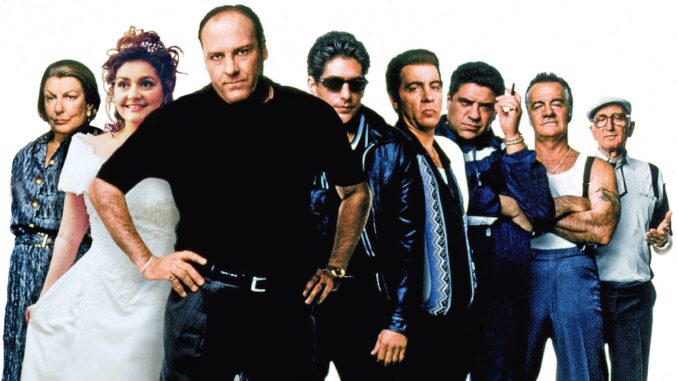
How Tony Soprano Inaugurated a New (and Raw) Version of Masculinity
The fact that Tony Soprano, in 1999, inaugurated a new version of masculinity—one that boldly refused to soften and make more palatable the violence that often goes along with the sexual (or any other) appeal of the raw—isn’t apparent until the fifth episode of the first season of the show, called “College.” The writer David Chase knew it would be transgressive.
The Godfather had Don Leone killed with his own hands only once, when he was a young immigrant (played by Robert De Niro) trying to establish himself in a neighborhood run by a greedy, less attractive Don. And once he was The Godfather (Marlon Brando) the film makes clear his biological family is his priority and justification for everything he does. When his son Michael lost touch with that, even going so far as to have his own brother killed, Coppola no longer bestows on him the affection that the first film brought to its depiction of Vito.
Tony Soprano, unlike Vito, likes the life, doesn’t dream of legitimacy, and complains to his therapist Dr. Melfi (Loraine Bracco) that “the sun is setting over the empire,” and that he’s come in at the end rather than beginning. Until “College,” we never see any real tenderness toward his children, and although he is troubled by panic attacks and mourns the leaving of a family of ducks from his pool, Tony is thoroughly coded as hyper-macho, from the opening credit journey from the Lincoln Tunnel to his north Jersey McMansion (“the rings on Tony’s meaty fingers, the thick dark hair on his forearms, the cigar between his teeth, the smoke trailing from his mouth as he checks the rearview mirror”) to his casual but undeniable dominance over the other guys in his gang and his soldier, nephew Christopher (Michael Imperioli).

“College,” however, whose frame is a trip with daughter Meadow (Jamie-Lynn Sigler) to check out colleges in Maine, reveals the side of Tony that is at the heart of the fantasy I described earlier, of the hazardous sweetness that the right woman can release into the beast. In this case and I suspect it is this way for many men—that woman is his daughter. Throughout the episode, Tony delightfully hugs, playfully pokes, grabs her hand, and communicates pride to Meadow—smart enough to be admitted to the best colleges, but as beautiful as “those models on the cover of Italian Vogue”—as he tells her at a candlelit dinner at a New England restaurant.
They are both dressed up, and the atmosphere and intimacy are more like a grown-up date than a meal between father and daughter. Twice during the episode they exchanged heartfelt “I love you”s—not in itself unusual between parent and child—but both also remarked on how special and unusual their relationship is. In fact, the relationship is unusual for Tony; he treats Meadow with an admiring respect that he doesn’t lavish on any other women in his life (not even Dr. Melfi), so much so that when she asks if he is in the Mafia, he admits to her (as he hasn’t). ‘t to either Carmela or Dr. Melfi) that his work involves some “illegal gambling… and whatnot.”
They both know the admission is a delicate way of encouraging that what she has suspected is true—an honesty that she rewards by contrasting him with the other boring, “full of shit” lawyer and executive dads of her friends, and praising that “you finally told the truth about this.” (In the shooting script, she also says “And anyway, you’re my sexy dad”—a line eliminated in the actual filming, no doubt because, given all the intimacy between them, it was too suggestive.)
